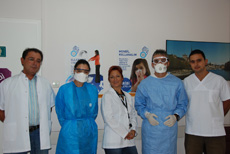 Assoc. Prof. Jale Erten and Dr. Bažak Soylu from East Campus Health Center and gave some important information in an interview with Bilkent News about the H1N1 flu. Assoc. Prof. Jale Erten and Dr. Bažak Soylu from East Campus Health Center and gave some important information in an interview with Bilkent News about the H1N1 flu.
What is swine influenza?
Swine influenza (A/H1N1virus) is a contagious disease that was first seen in swine and then spread to human beings. It is a disease that can cause very mild flu symptoms but also death from severe pneumonia.
How does it spread?
The swine flu virus spreads in the same way that seasonal flu spreads. It is passed from person to person when an infected person coughs or sneezes. These small droplets can be directly taken from the air. People can also be infected by touching infected surfaces with their hands (door handles, tables, chairs which are infected with flu virus) and then touching their mouth, nose or eyes with infected hands. The virus can also be transmitted by shaking hands and kissing. People with the swine flu virus can spread it from 1 day before getting sick to 5 to 7 days later.
What are the symptoms of the disease?
The symptoms are like flu symptoms:
- Coughing
- Sore throat
- Runny or stuffy nose
- Body aches
- Headache
- Tremors
- Fatigue
- Vomiting and diarrhea
If you are experiencing flu-like symptoms
If you are sick and have flu-like symptoms stay home for at least 24-48 hours until your fever is gone and call the health center. Swine flu symptoms are not specific. For this reason, you have to inform campus health staff about your medical history. Patients at high risk must apply to a health center.
High risk situations are:
- In the last 7 days having close contact with a patient carrying A/H1N1 virus
- For the last 7 days visiting a country that has had a swine flu case
How can we know if it is swine influenza or not?
Detecting the virus in first 4-5 days of illness in respiratory secretions taken from throat or nose of the patient with a special test.
What can we do to protect ourselves from swine flu?
- We must wash our hands frequently with soap and water for 15 to 20 seconds. Also alcohol based hand disinfectants are effective. In cases when we cannot wash our hands we must avoid touching our mouth, nose and eyes.
- We must keep our immune system strong. We must sleep properly, eat healthy foods (a lot of fruits, vegetables) and drink fluids frequently.
- We must avoid close contact with people having the disease.
- We must cover our mouth and nose with disposable tissue while coughing and sneezing. If we cannot find any tissue we can use the inside part of our jacket or elbow.
- We must try not to stay too long in closed, crowded or poorly ventilated places.
- We must frequently air out the places where we stay.
- We must avoid traveling to countries where swine influenza is detected.
- We must disinfect surfaces of objects (door handles, tables, telephones etc.)
Is there a vaccine?
Studies on developing a vaccine for human beings are still going on. Vaccines for influenza do not have any protective effect for swine influenza.
Is there any treatment for swine influenza?
Antiviral drugs used for regular influenza are also used for swine influenza. These drugs can decrease the severity of the disease and decrease its duration if they are given in first 48 hours after the symptoms start.
While having influenza in which cases emergency help must be requested?
- Difficulty in breathing
- Severe coughing
- Sudden dizziness
- Severe or persistent nausea and vomiting
- Confusion
Health services about swine flu in Bilkent University:
- Seminars and education about swine flu for student and staff
- Seasonal flu vaccine campaigns
- Distribution of 3000 swine flu brochures
- Distribution of posters from Health Minister (protective methods for flu)
- Informative emails to all students, academics & administrative staff
- Strategy if swine flu pandemic occurs
- Taking care to guide students and staff who have flu like symptoms
If you have any further questions don't hesitate to call or send an
e-mail to health centers.
Main Campus Health Center
ext. 1666 or 1392
East Campus Health Center
ext. 5266 or 5057
Email: bilheal@bilkent.edu.tr

|







